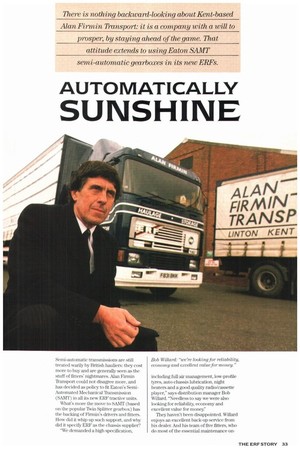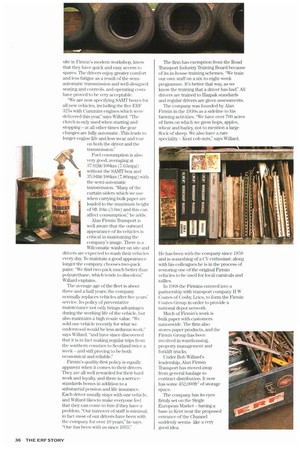AUTOMATICALLY
Page 189

Page 192

If you've noticed an error in this article please click here to report it so we can fix it.
SUNSHINE
Semi-automatic transmissions are still treated warily by British hauliers: they cost more to buy and are generally seen as the stuff of fitters' nightmares. Alan Firmin Transport could not disagree more, and has decided as policy to fit Eaton's SemiAutomated Mechanical Transmission (sAmT) in all its new ERF tractive units.
What's more the move to SAMT (based on the popular Twin Splitter gearbox) has the backing of Firmin's drivers and titters. How did it whip up such support, and why did it specify ERF as the chassis supplier?
"We demanded a high specification, including full air management, low-profile tyres, auto chassis lubrication, night heaters and a good quality radio/cassette player," says distribution manager Bob Willard. "Needless to say we were also looking for reliability, economy and excellent value for money" They haven't been disappointed. Willard enjoys an excellent back-up service from his dealer And his team of five fitters, who do most of the essential maintenance on site in Firmin's modern workshop, know that they have quick and easy access to spares. The drivers enjoy greater comfort and less fatigue as a result of the semiautomatic transmissitin and well-designed seating and controls, and operating costs have proved to he very acceptable.
"We are now specifying SAMT boxes for all new vehicles, including the five F.RF 325s with Cummins engines which were delivered this year," says Willard. "The clutch is only used when starting and stopping — at all other times the gear changes are fully automatic. This leads to longer engine life and less wear and tear on both the driver and the transmission."
comumption is also vezy good, averaging at :i7.0211t/1001uu (7.63mpg) without the SAMT box and 25.94litil Minn (7.86mpg) with the semi-automatic transmission. "Many of the curtain-siders which we use when carrying hulk paper are loaded to the maximum height of 911 10in (3.0m) and this can affect consumption:. he adds.
Alan Finnin Transpon is well aware that the outward appearance of its vehicles is critical in maintaining the company's image. There is a Wilcomatic washer on-site and (Inver; are expected to wash their vehicles every day. Tii maintain a good appearance longer the company chooses two-pack paint: "We find two-pack much better than polyurethane, which tends to discolout;" Willard explains.
The average age of the fleet is about three and a half years: the company normally replaces vehicles after five years' service. Its policy of preventative maintenance not only brings advantages during the working life of the vehicle, but also maintains a high resale value. "We sold one vehicle recently for what we understood would be less arduous work," says Willard. "and have since discovered that it is in fact making regular trips from the s( int hern counties In Scotland twice a week — and still provitig to be both economical and reliable."
Finnin's quality-fitm policy is equally apparent when it comes to their drivers. They are all well rewarded for their hard work and loyalty, and there is a servicestandards bonus in addition to a substantial pension and life insurance. Each driver usually stays with one vehicle, and Willard likes to make everyone feel that they can come to him if they have a problem. "Our turnover of staff is minimal, in fact most of our drivers have been with the company for over 10 years," he says. "One has been with us since 1955." The firm has exemption from the Road Transport Industry 'Thaining Board because of its in-house training schemes. "We train our own staff on a six-to-eight-week programme. It's better that way, as we know the training that a driver has had" All drivers are trained to Hazpak standards and regular drivers are given assessments.
The company was founded by Alan Finnin in the 1930s as a sideline to his farming activities. "We have over 700 acres of farm on which we grow hops, apples, wheat and barley, not to mention a large flock of sheep. We also have a rare speciality — Kent cob nuts," says Willard.
He has been with the company since 1959 and is something of a CV enthusiast: along with his colleagues he is in the process of restoring one of the original Firmin vehicles to be used for local carnivals and rallies.
In 1968 the Firmins entered into a pannenthip with transport company II W Coates of Cosby, I.eics, to form die Finnin Cc ales Group in order to provide a national depot network.
Much of Firmin's work is bulk paper with customers nationwide. The firm also stores paper products, and the Firmin Group has been involved in warehousing, property management and forklift trucks,
Under Bob Willard's leadership, Alan Finnin Transport has moved away from general haulage to contract distribution. It now has some 452,000ft2 of storage space.
The company has its eyes firmly set on the Single European Market — having a base in Kent near the proposed entrance of the Chunnel suddenly seems like a very good idea.




































































































































































































